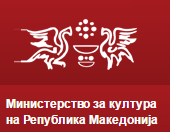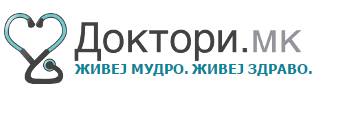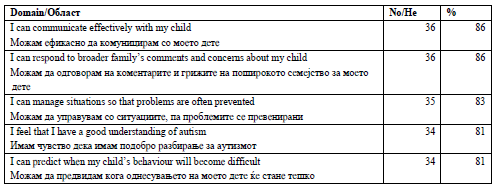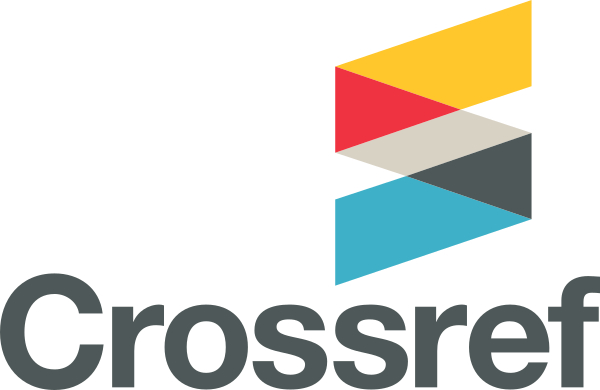JSER Policies
JSER Online
JSER Data
Frequency: quarterly
ISSN: 1409-6099 (Print)
ISSN: 1857-663X (Online)
Authors Info
- Read: 49107
|
ВЛИЈАНИЕТО НА АУТИСТИЧНИОТ СПЕКТАР А
НАРУШУВАЊЕ ВРЗ МАКЕДОНСКИТЕ СЕМЕЈСТВА И НИВНИТЕ ИСКУСТВА ЗА ЕДУКАЦИЈА НА РОДИТЕЛИТЕ
Јасмина ТРОШАНСКА1 Владимир ТРАЈКОВСКИ1, 2 Филип ЈУРТОСКИ1 Давид РОС ПРИС3, 2
1 Македонско Научно Здружение за Аутизам
2 Универзитет „Св. Кирил и Методиј“, Филозофски факултет, Институт за дефектологија
3Универзитет во Нортемптон, Велика Британија
Примено: 08.06.2018
Прифатено: 03.08.2018
УДК 364-787.7-055.52(497.7):616.896-053.2(4-12)
Вовед
Да се живее со аутизам
Присуството на аутистичниот спектар на нарушувања АСН во семејството е голем фактор кој влијае врз функционалноста на семејството и неговата добросостојба (1, 2). Типичните карактеристики на оваа состојба – тешкотии и разлики во социјалната комуникација и интеракција, ограничени и повторувачки интереси, сензорна сензитивност – може значајно да влијаат врз сите аспекти на семејниот живот, ограничување на социјалната инклузија, достигнувања и постигнувања за другите членови во семејството (3 - 5).
Едукација на родителите за аутизмот: ESIPP проектот Едукацијата на родители е клучна интервенција кај АСН. Може да доведе до намалување на нивото на анксиозност и стрес, зголемено разбирање за АСН, ефикасност на родителите и квалитетот на живот и подобрувања во справувањето, интеракцијата родител – дете и комуникацијата (6). Како и да е, ваквата едукација е ограничена или непостоечка низ југо-источна Европа (7 - 9). За да се адресира оваа ситуација, беше спроведен тригодишен проект (септември 2015 - август 2018) – финансиран од Европската комисија и предводен од Универзитетот во Нортхамптон – за да се обезбеди едукација на родителите во хрватските, кипарските и македонските семејства.
Проектот „Еднаква и социјална инклузија низ позитивно родителство“ (ESIPP) – вклучуваше родители од цела Европа, вклучувајќи го и Македонското научно здружение за аутизам (МНЗА). Колаборативна методологија заснована на акција (10) беше користена за да се развие, исполни и процени проектот. Преземените активности вклучуваа идентификација на обуката, содржина на тренингот и процесот на испорачување, развој на материјалите за тренинг и тренинг тимови во трите држави, одредби за едукација на родителите во семејствата и развојот на политички препораки за креаторите на политиката (11). Овој труд се однесува на резултатите добиени од македонските родители.
Методологија
Проследено од првичното анкетирање за идентификување на приоритетите на семејствата (12), родителите од МНЗА работеа заедно со колегите од Хрватска, Кипар и Обединетото Кралство за создавање на тренинг материјалите. Дополнително, пет македонски тренери беа истренирани за да ја претстават програмата. Шест групи на македонските родители/старатели беа тренирани за време на проектот (n=70) на пет различни локации во државата: Скопје, Велес, Охрид, Битола и Дебар. Проценката беше направена со употреба на комбиниран процес и резултат од методологијата за проценка (13) преку дизајн на повеќе фазни различни методи кои вклучуваат и квантитативни и квалитативни извори на податоци и методи за анализирање (14).
Собирање на податоците и нивно анализирање
Прашалници
Беа создадени структуирани прашалници за собирање податоци од родителите пред и после присуството на сесиите за едукација на родителите. Овие прашалници содржеа Скала за квалитетот на живот (the CarerQoL) одобрена за употреба кај семејствата кои живеат со АСН (15). Податоци беа собрани во однос на семејниот квалитет на живот, разбирањето на родителите за АСН, очекувања од програмата за едукација на родителите и импактот од присуството на истата. Квантитативните податоци беа анализирани со употреба на софтверот ИБМ СПСС.
Интервјуа
Полуструктуирани интервјуа (16) беа спроведени со членови на семејствата во секоја од групите, три месеци после одржаниот тренинг, во однос на разбирањето на родителите за АСН, нивните искуства со АСН во секојдневниот живот, нивното искуство со програмите за едукација на родителите и нивниот импакт (ако воопшто постои). Еден опсежен софтвер за анализа на квалитативни податоци беше употребен низ проектот: македонските родители користеа ATLAS.ti (17). Транскриптите од интервјуата беа анализирани со употреба на квалитативна тематска анализа (18).
Примерок
Прашалник
Прашалник пред едукацијата на родителите беше обезбеден од сите 70 членови на семејствата кои присуствуваа на 6-те обуки, прашалник после едукацијата на родителите беше обезбеден од 42 членови на семејствата, стапка на одговор од 62 %.
|
THE IMPACT OF ASD ON MACEDONIAN FAMILIES AND THEIR EXPERIENCE OF PARENT EDUCATION
Jasmina TROSHANSKA1 Vladimir TRAJKOVSKI1, 2 Filip JURTOSKI1 David ROSS PREECE3., 2
1 Macedonian Scientific Society for Autism.
2 Institute of Special Education and Rehabilitation. Faculty of Philosophy, University “Ss. Cyril &Methodius”;
3 University of Northampton, Northampton, United Kingdom.
Received: 08.06.2018
Accepted: 03.08.2018
Original article
Introduction
Living with autism
The presence of autism spectrum disorder (ASD) in the family is a major factor affecting family functioning and wellbeing (1, 2). The typical characteristics of the condition – difficulties and differences in social communication and interaction, restricted and repetitive interests, sensory sensitivities – can impact significantly upon all aspects of family life, restricting social inclusion, achievement and fulfilment for all family members (3 - 5).
Parent education in autism: the ESIPP project Parent education (PE) is a key intervention in ASD. It can lead to reduced levels of anxiety and stress, increased understanding of ASD, parental efficacy and quality of life, and improvements in coping, parentchild interaction and communication (6). However, such education is limited or non-existent throughout south-east Europe (7 - 9). To begin to address this situation, a three-year project (September 2015-August 2018) was undertaken – funded by the European Commission and led by the University of Northampton – to provide PE regarding ASD to Croatian, Cypriot and Macedonian families. The project – Equity and Social Inclusion through Positive Parenting (ESIPP) – involved partners from across Europe, including the Macedonian Scientific Society for Autism (MSSA). A collaborative, actionbased methodology (10) was used to develop, deliver and evaluate the project. Activity undertaken included the identification of the curriculum, training content and delivery process; the development of training materials and training teams in the three countries; the provision of PE to families; and the development of policy recommendations for policy-makers (11).
This paper reports findings regarding Macedonian parents.
Methodology
Following an initial survey to identify family priorities (12), partners from MSSA worked alongside colleagues from Croatia, Cyprus and the UK to develop the training materials. In addition, five Macedonian trainers were trained to deliver the programme. Six cohorts of Macedonian parents/carers were trained during the project lifetime (n=70) in five locations across the country: Skopje, Veles, Ohrid, Bitola and Debar. Evaluation was undertaken using a combined process and outcome evaluation methodology (13) via a multi-phase mixed methods design incorporating both quantitative and qualitative data sources and methods of analysis (14).
Data collection and analysis
Questionnaires
Structured questionnaires were designed to gather data from parents before and after they attended PE sessions. These incorporated a Quality of Life Scale (the CarerQoL) validated for use in families living with ASD (15). Data were gathered regarding family quality of life, parental understanding of ASD, expectations regarding the PE programme and the impact of attendance. Quantitative data were analysed using IBM SPSS Software.
Interviews
Semi-structured interviews (16) were conducted with family members from each cohort three months after training regarding parents’ understanding of ASD, their experience of ASD in their daily lives, their experience of the PE programme and its impact (if any). A range of qualitative data analysis software was used across the project: Macedonian partners used ATLAS.ti (17). Transcripts of the interviews were analysed using qualitative thematic analysis (18).
Sample
Questionnaires
Pre-PE questionnaires were collected from all 70 family members attending the six courses; post-PE questionnaires were collected from 42 family members, a response rate of 60%.
|
More text goes here.
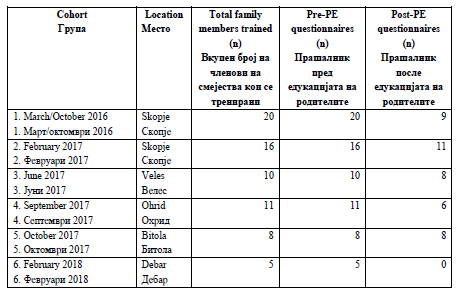
|
Интервјуа
Полуструктуирани интервјуа беа направени со 16 родители/старатели (23 % од сите роднини кои присуствуваа на едукацијата за родители). Интервјуираните лица беа само избрани и беа извлечени од сите 6 групи на учесници на обуките. Осум беа од Скопје и 8 од другите градови. Шест интервјуирани лица беа од машки пол и 10 беа од женски пол, на возраст од 26 до 69 години (средна вредност = 24,5 години). Осум го имаа напуштено образованието после завршување на средно образование, седум оделе на факултет (еден на магистерски) и еден има одено во воено училиште. Осум од испитаниците беа со платено вработување, пет (сите жени) беа на платено вработување, двајца примаа пензија и еден
беше студент. Сите демографски податоци за испитаниците се обезбедени во Табела 2.
|
Interviews
Semi-structured interviews were undertaken with 16 parents/carers (23% of all relatives attending PE). Interviewees were self-selecting and were drawn from all six cohorts attending PE. Eight were from Skopje, and eight from elsewhere in the country. Six interviewees were male and ten were female; ages ranged from 26 years to 69 years (mean = 24,5 years). Eight had left education after secondary school; seven had attended university (one to post-graduate level), and one had attended military school. Eight interviewees were in paid employment; five (all female) were not in paid employment, two were in receipt of a pension and one was a student. Full demographic data regarding interviewees is provided in Table 2.
|
Табела 2. Демографски податоци кои се однесуваат на испитаниците
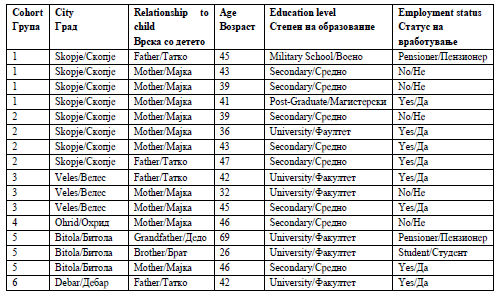
|
Резултати и дискусија
Искуства на родителите за живеење со АСН CarerQoL собраните податоци пред учеството на обуката за едукација на родителите во однос на перцепцијата на сите 70 родители/негуватели во однос на негувањето и нивните искуства за живеењето со АСН (види Табела 3). Учесниците на интервјуто исто така беа прашани за нивното искуство за живеење со АСН.
|
Results and discussion
Families’ experience of living with ASD The CarerQoL collected data before attendance at PE regarding all 70 parents’/carers’ perceptions regarding caregiving and their experience of living with ASD (see Table 3). Interview participants were also asked about their experience of living with ASD.
|
Табела 3. Перцепција на респондентите во однос на нивната ситуација како негуватели (n=70)
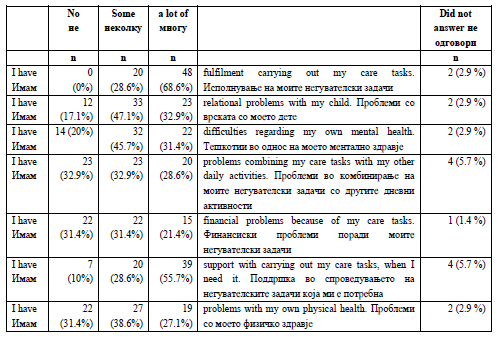
|
Влијанието/Импактот на АСН
Сите респонденти кои го комплетираа CarerQoL кажаа дека тие наоѓаат исполнување во грижата за нивното дете со АСН. Сепак, 80 % идентификуваа дека искусиле проблеми во врската со детето кое има АСН и во интервјуата дополнително го расветлија степенот до кој семејствата се афектирани од присуството на АСН. Родителите, браќа/сестри и дедовци/баби исто така укажаа на тешкотиите во многу области од семејниот живот и чувството на исцрпе-
ност и изолација.
„Исполнувањето на времето е тешко. Некогаш немам идеја што да правам. Понекогаш сум уморна и во фаза на хибернација. За жал, немам на кого да му се јавам за поддршка, сè е оставено на мене.“ (мајка од Скопје).
„Откако беше родена нашата внука нашиот живот се промени. Родителите ги донесуваат одлуките, но не е лесно ниту за дедовците/бабите.“ (дедо од Прилеп).
Здравствени и финансиски проблеми
Над 75 % од респондентите укажале на тешкотии во однос на нивното психичко здравје и 60 % искусиле проблеми со нивното физичко здравје; овие се високи проценти, но се поддржани од претходни истражувања кои укажуваат дека родителите на деца со АСН најверојатно ќе искусат сериозен психолошки стрес и слаб здравствен квалитет на живот отколку оние родители на деца без попреченост (19, 20). Над 50 % од респондентите укажале на финансиските проблеми поради нивните негувателски одговорности. Идентификувано е дека живеењето со АСН може да биде поврзано со финансиски проблеми (21, 22). Посебни проблеми се ниските приходи кај овие семејства (поради потребата од пружање нега во поголемиот број случаи) и, исто така, трошоците поврзани со медицинските или терапевтските интервенции.
„Многу е скапо да се има дете со аутизам. Ние плаќаме за третман на посебно образование бидејќи немаме специјализирани услуги.“ (татко од Гостивар).
Поддршка
Поголемиот број (речиси 60 %) укажаа дека примиле повеќе пати неформална поддршка. Ова е позитивно споредбено со истражувањата во западна Европа, каде поддршката е утврдена како ограничена (23). Во рамките на интервјуата, значењето на поширокото семејство – и дедовците/бабите особено – во давањето на поддршка беше идентификувано.
„Дури и за пазарење во супермаркетите, јас имам потреба од некој да го чува мојот син за тоа време. Покрај моите татко и мајка не добивам помош од други лица ... дури и тие не се снаоѓаат најдобро.“ (мајка од Скопје).
Во споредба, како и во другите места во регионот (24), професионалната поддршка се смета како неадекватна и покрај поддршката што тие ја добиваат, над 65 % од респондентите укажаа дека ним им е тешко да ги комбинираат нивните негувателски задачи со нивните други обврски.
„Што е системот за поддршка? Ние го немаме воопшто. Ние сме оставени самите на себе.“ (мајка од Велес).
Стигма и изолација
Семејствата низ цела држава зборуваа за дискриминационите однесувања и стигмата, во однос со претходните истражувања во југоисточна Европа (7). Децата со АСН се изолирани во нивните училишта и локални заедници и искусуваат задевање и булинг.
„Тој сака да се социјализира со децата во неговото училиште, но тие го навредуваат. Тој си доаѓа дома и вика, јас не сакам повеќе да одам на училиште, децата се лоши!“ (мајка од Охрид).
„Мојот брат не можe да си најде пријатели. Ако го земам со мене и со моите пријатели, тоа е единственото пријателство што го има.“ (брат од Битола).
Едукација на родителите
Позитивно влијание
Четириесет и двајца членови на семејства кои го завршија прашалникот после обуката беа екстремно позитивни во однос на сите аспекти од програмата на обуката (види Табела 4). Податоците кои беа собрани укажаа дека на родителите им е од корист присуството на обуката. После присуството, над 80 % од родителите сметале дека тие можат ефективно да комуницираат со нивните деца, да одговорат на потребите на поширокото семејство и да ги менаџираат ситуациите поефикасно за да спречат појавување на проблеми и дека сега подобро го разбираат аутизмот.
|
Impact of ASD
All respondents completing the CarerQoL reported that they found fulfilment in caring for the child with ASD. Nonetheless, 80% identified that they experienced relational problems with the child with ASD; and the interviews shed further light on the extent to which family life was significantly affected by the presence of ASD. Parents, siblings and grandparents alike reported difficulties in many areas of family life and experiencing exhaustion and isolation.
“Filling the time is hard. I sometimes do not have any idea what to do. Sometimes I’m tired or in a phase of hibernation. Unfortunately, I have no one to call for support, it is all down to me.” (Mother – Skopje).
“Since our granddaughter was born our life has changed. Parents make the decisions, but it is not easy for grandparents either.” (Grandfather – Prilep).
Health and financial issues
Over 75% of respondents reported difficulties regarding their mental health, and over 65% were experiencing problems with their physical health: these are high percentages but are supported by previous research which suggests that parents of children with ASD are more likely to experience serious psychological distress and poor health-related quality of life than those of children with other disabilities (19,
20). Over 50% of respondents reported financial problems due to their caring responsibilities. It has been identified that living with ASD can be associated with financial problems (21, 22). Particular issues are such families’ relatively low incomes (due in many cases to the need to provide care) and also the costs associated with medical or therapeutic interventions.
“It is very expensive to have a child with autism. We pay for special educational treatment, because we don’t have any specialised service.” (Father – Gostivar).
Support
A majority (almost 60%) identified that they received a lot of informal support. This compares favourably with Western European studies, where support has been identified as more limited (23). Within the interviews, the importance of the wider family – and grandparents in particular – in providing support was identified.
“Even to shop at the supermarket, I need someone to keep my son for that time. Apart from my mother and father I have no help from anyone…And even they do not manage the best.” (Mother – Skopje).
By contrast, as elsewhere in the region (24), professional support was seen as inadequate; and despite the support that they received, over 65% of respondents identified that they found it difficult to combine their care tasks with their other responsibilities.
“What is a system of support? We do not have that at all. We are left alone.” (Mother – Veles).
Stigma and isolation
Families across the country spoke of discriminatory behaviour and stigma, in line with other previous studies in southeast Europe (7). Children with ASD were isolated within their schools and local communities and experienced teasing and bullying.
“He wants to socialise with the children in his school, but they insult him…He comes home and shouts, I do not want to go to school any more, the kids are bad!” (Mother – Ohrid). “My brother can’t find his own friends. If I take him with me and my friends, it’s the only friendship he has.” (Brother – Bitola).
Parent education
Positive impact
The 42 family members who completed post-training questionnaires were extremely positive with regard to all aspects of the PE programme (see Table 4). The data collected indicated that parents found attending the training programme beneficial. After attendance,
over 80% of parents felt that they could communicate effectively with their children respond to the concerns of the wider family and manage situations effectively to prevent problems arising, and that they now had a good understanding of autism.
|
|
Бенефити
Респондентите беа прашани да ги идентификуваат главните бенефити од присуството на обуките за едукација на родителите (види Табела 5). Шеесет проценти (60 %) од испитаниците сметаат дека се важни идентификацијата на ефективните стратегии кои се соодветни за аутизмот и нивните пристапи. Ова беше дополнително поддржано од квалита-
тивните податоци.
„Како родител, имам потреба од практични решенија за да му помогнам на моето дете.“ (мајка од Скопје).
|
Benefits
Respondents were further asked to identify the main benefits of attending the PE programme (see Table 5). The identification of effective autism-appropriate strategies and approaches was considered important by 60% of respondents. This was further supported by the qualitative interview data.
“As a parent, I need more practical tools to help my child.” (Mother – Skopje).
|
Table 5. Main benefits from the presence at the ESIPP programmes for parents’ education
Табела 5. Главни бенефити од присуството на ESIPP програмите за едукација на родителите (n=42)
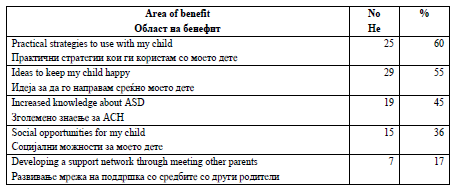
|
Родителите го ценат проектот ESIPP за едукација на родителите и постоеше желба за да се направи ваквата едукација достапна за пошироките маси на одржлива основа.
„Во оваа држава мора да направиме големи промени за родителите. Системот треба веднаш да ги испрати родителите на задолжителни тренинзи како што е ESIPP тренингот, за да видат сè што ние видовме за
време на тренинзите.“ (мајка од Скопје)
Како и да е, недостигот на професионална експертиза доведе некои родители да се запрашаат за вредноста на ставање во пракса она што го научија за време на ESIPP тренинзите.
„Како јас ќе го имплементирам советот што ми беше даден ако самите професионалци не ги имплементираат истите?“ (татко од Скопје).
Претходните истражувања идентификувале дека учествата на тренинзите за едукација на родителите се од помош во намалување на чувството на изолација и развивањето на мрежа за поддршка (25, 26).
Како и да е, ова не беше приоритет на македонските испитаници, од кои 17 % (n=17) укажаа дека тренинзите се од бенефит. Во некои случаи, ова може да е така бидејќи родителите веќе се познаваат меѓу себе, особено ако нивните деца одат во исто училиште. Кај другите, ова може да биде дополнителен пример на стигматизација и изолација којашто е дел од животот на овие семејства.
„(Присуството на едукацијата за родители) не ми помогна да стапам во контакт со други родители бидејќи луѓето се конзервативни и се срамат. Не успеав да создадам искрено пријателство со другите иако се познаваме, бидејќи живееме во ист град.“
(татко од Велес).
Зголемена среќа кај родителите и намалени проблеми во врската Беше употребен CarerQoL за собирање на податоци пред и после тренингот. Дополнително од домените за квалитет на живот прикажани во Табела 3, испитаниците беа прашани да го идентификуваат нивниот севкупен степен на среќа, на скала од 0 (целосно несреќен) до 10 (целосно среќен) (види Табела 6).
|
Parents valued the ESIPP parent education, and there was a desire to see such education being made more widely available on a sustained basis.
“In this country, we need to make very big changes for parents…The system should immediately send parents to obligatory training such as the ESIPP training, to see everything we saw when we were on it.” (Mother – Skopje).
However, the lack of professional expertise led some parents to question the value of putting what they had learned on the ESIPP training into practice.
“How will I apply the advice I have been given if the professionals do not apply them?” (Father -Skopje).
Previous studies have identified attending parent education as helpful in reducing feelings of isolation and developing a support network (25, 26). However, this was not prioritised by Macedonian respondents, of whom only 17% (n=7) identified this as a benefit. In
some cases, this may be because parents already know each other, particularly if their children attend the same school. In others however, this may be a further example of the stigma and isolation that families could experience.
“(Attending parent education) did not help me to connect with others, because people are conservative and embarrassed. I have not managed to make a sincere friendship with others, even though we know each other because we live in a small town.” (Father – Veles).
Increased parental happiness and reduced relational problems The CarerQoL was used to gather data before and after training. In addition to the domains of quality of lifes hown in Table 3, respondents were also asked to identify their overall level of happiness, on a scale from 0 (completely unhappy) to10 (completely happy) (see Table 6).
|
|
|
|
Табела 6. CarerQoL Одговори пред и после тренингот на родители (n=42)

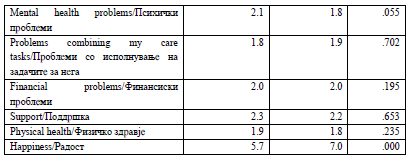
|
Анализите на одговорите дадени пред и после тренингот, со користење на тестот Вилкоксон за потпишан ранг, идентификува статистички значајна разлика во однос на среќата на родителите (р=0.000, со средна вредност зголемена од 5.5 на 7.0) и проблеми во врската (р=0.028 со намалување на
резултатот од 2.1 на 1.9). Ова укажува дека ова може да е резултат на програмата за едукација на родителите со што се подобрува сфаќањето и свеста кај родителите и има дава пристапа до стратегии кои можат да направат позитивна разлика во нивните животи.
Заклучни коментари
ESIPP проектот беше наменет за развој, доставување и проценка на едукацијата на родителите. Едукацијата заснована на докази им беше обезбедена на 70 македонски семејства и се покажа дека има позитивно влијание врз разбирањето на родителите, нивните вештини и нивната радост. Како и да е, многу семејства во земјата сè уште не можат да пристапат до овие тренинзи и е јасно дека семејствата кои живеат со АСН остануваат под голем стрес и притисок. Има потреба од континуирана едукација на родителите низ државата и подобрување на тренинзите за професионалците кои работат со деца со АСН и нивните семејства, како и за развивање пошироки услуги за поддршка кои ќе ги адресираат потребите
на оваа популација. Потребна е идна активност за гарантирање на позитивни крајни резултати.
Финансирање
Оваа работа е поддржана од Еразмус + програмата на Европската комисија (број на грант 2015-1-UK01-KA204-013397). Оваа поддршка не значи поддршка на содржината која е одраз на погледите на авторите и Комисијата не може да биде земена за одговорна за каква и да е понатамошна употреба на информациите.
|
Tnalysis of pre-PE and post-PE responses using the Wilcoxon signed-ranks test identified statistically significant differences with regard to both parental happiness (p=0.000, with mean scores rising from 5.5 to 7.0) and relational problems (p=0.028, with scores
decreasing from 2.1 to 1.9). It is suggested that this\ may result from the PE programme both improving parental understanding and awareness and giving them access to strategies that could make a positive difference in their lives.
Concluding comments
The ESIPP project was intended to develop, deliver and evaluate parent education. Evidence-based education has been provided to 70 Macedonian families and it has been shown to have had a positive impact on parental understanding, skills and happiness.
However, many families within the country have not yet been able to access training; and it is clear that families living with ASD remain under significant stress and pressure. There is a need for continued
parent education across the country and improved training for professionals working with children with ASD and their families, as well as the development of broader support services to address the needs of this population. Further activity is required to ensure more
positive outcomes.
Funding
This work was supported by the European Commission under Erasmus+ (grant number 2015-1-UK01-KA204-013397). This support does not constitute an endorsement of the contents which reflect the views only of the authors, and the Commission cannot be held responsible for any use which may be made of the information contained therein.
|
|
Литература / References:
1. Davis NO, Carter AS (2008) Parenting stress in mothers and fathers of toddlers with autism spectrum disorders: associations with child characteristics. Journal of Autism and Developmental Disorders 2008; 38(7): 1278-1291.
2. Hastings RP, Kovshoff H, Ward NJ, degli Espinosa F, Brown T, Remington B. Systems analysis of stress and positive perceptions in mothers and fathers of pre-school children with autism. Journal of Autism and Developmental Disorders 2005; 35(5): 635-644.
3. Hayes SA, Watson SL. The impact of parenting stress: a meta-analysis of studies comparing the experience of parenting stress in parents of children with and without autism spectrum disorder. Journal of Autism and Developmental Disorders 2013; 43(3): 629-642.
4. Karst JS, van Hecke AV. Parent and family impact of autism spectrum disorders: a review and proposed model for intervention evaluation. Clinical Child and Family Psychology Review 2012; 15(3): 247-277.
5. Schaaf RC, Toth-Cohen S, Johnson SL, Outten G, Benevides TW. The everyday routines of families of children with autism: examining the impact of sensory processing difficulties on the family. Autism 2011; 15(3): 373-389.
6. Preece D, Trajkovski V. Parent education in autism: a literature review. Hrvatska Revija za Rehabilitacijska Istraživanja 2017; 53(1): 118-128.
7. Daniels AM, Como A, Hergüner S, Kostadinova K, Stošić J, Shih A. Autism in Southeast Europe: a survey of caregivers of children with autism spectrum disorders. Journal of Autism and Developmental Disorders 2017; 47(8): 2314-2325.
8. Delfos M. Autism in Bosnia-Herzegovina. Sarajevo: Universities Autism Expertise Group – UAEG, 2010.
9. Hansen BD, Orton EL, Adams C et al. A pilot study of a behavioral parent training in the Republic of Macedonia. Journal of Autism and Developmental Disorders 2017; 47(6):1878-1889.
10. Gray DE. Doing Research in the Real World. 4th Edition. London: Sage, 2018.
11. Aguila-Muñoz S, Baranger A, Bramble P. et al. Improving Quality of Life for people on the Autism Spectrum and their families through Parent Education: recommendations for policy-makers. Brussels: ESIPP, 2018.
12. Preece D, Symeou L, Stošić J et al. Accessing parental perspectives to inform the development of parent education in autism in south-eastern Europe. European
Journal of Special Needs Education 2017; 32(2): 252-269.
13. Royse D, Thyer BA, Padgett DK. Program Evaluation: an introduction to an evidence-based approach. 6th Edition. Boston, MA: Cengage, 2016.
14. Creswell JW, Plano Clark VL. Designing and Conducting Mixed Methods Research 2nd Edition. London: Sage, 2011.
15. Hoefman R, Payakachat N, van Exel J et al. (2014) Caring for a child with autism spectrum disorder and parents’ quality of life: application of the CarerQol. Journal of Autism and Developmental Disorders 2014; 44(8): 1933-1945.
16. Robson C, McCartan K. Real World Research. 4th Edition. Chichester: Wiley, 2016.
17. Friese S. Qualitative Data Analysis with ATLAS.ti. London: Sage, 2014.
18. Guest GS, MacQueen KM, Namey EE. Applied Thematic Analysis. London: Sage, 2012.
19. Bromley J, Hare DJ, Davison K et al. Mothers supporting children with autistic spectrum disorders: social support, mental health status and satisfaction with services. Autism 2004; 8(4): 409-423.
20. Allik H, Larsson J-O, Smedje H. Health-related quality of life in parents of school-age children with Asperger syndrome or high-functioning autism. Health and Quality of Life Outcomes 2006; 4(1): 1-8.
21. Sharpe DL, Baker DL. Financial issues associated with having a child with autism. Journal of Family and Economic Issues2007; 28(2): 247-264.
22. Nealy CE, O’Hare L, Powers JD et al. The impact of autism spectrum disorders on the family: a qualitative study of mothers’ perspectives. Journal of Family Social Work 2012; 15(3): 187-201.
23. Preece D, Jordan, R. Short breaks services for children with autistic spectrum disorders: factors associated with service use and non-use, Journal of Autism and Developmental Disorders 2007; 37 (2): 374-385.
24. Lisak N, Bratović D, Anić T. Experiences from the Educational System – Narratives of Parents with Children with Disabilities in Croatia. Journal of Special Education and Rehabilitation 2017; 18(3-4): 91-125.
25. Cutress AL, Muncer SJ. Parents’ views of the National Autistic Society’s EarlyBird Plus Programme. Autism 2014; 18(6): 651-657.
26. Farmer J, Reupert A. Understanding autism and understanding my child with autism: an evaluation of a group parent education program in rural Australia. Australian Journal of Rural Health 2013; 21(1): 20-27
|
Share Us
Journal metrics
-
 SNIP 0.059
SNIP 0.059 -
 IPP 0.07
IPP 0.07 -
 SJR 0.13
SJR 0.13 -
 h5-index 7
h5-index 7 -
 Google-based impact factor: 0.68
Google-based impact factor: 0.68
10 Most Read Articles
- PARENTAL ACCEPTANCE / REJECTION AND EMOTIONAL INTELLIGENCE AMONG ADOLESCENTS WITH AND WITHOUT DELINQUENT BEHAVIOR
- RELATIONSHIP BETWEEN LIFE BUILDING SKILLS AND SOCIAL ADJUSTMENT OF STUDENTS WITH HEARING IMPAIRMENT: IMPLICATIONS FOR COUNSELING
- EXPERIENCES FROM THE EDUCATIONAL SYSTEM – NARRATIVES OF PARENTS WITH CHILDREN WITH DISABILITIES IN CROATIA
- INOVATIONS IN THERAPY OF AUTISM
- AUTISM AND TUBEROUS SCLEROSIS
- THE DURATION AND PHASES OF QUALITATIVE RESEARCH
- REHABILITATION OF PERSONS WITH CEREBRAL PALSY
- DISORDERED ATTENTION AS NEUROPSYCHOLOGICAL COGNITIVE DISFUNCTION
- DIAGNOSTIC AND TREATMENT OPTIONS IN AUTISTIC SPECTRUM DISORDERS – AN OVERVIEW
- HYPERACTIVE CHILD`S DISTURBED ATTENTION AS THE MOST COMMON CAUSE FOR LIGHT FORMS OF MENTAL DEFICIENCY

